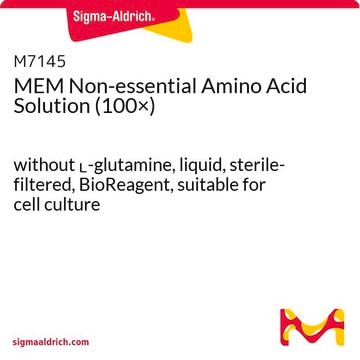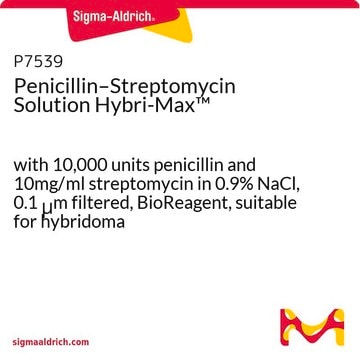G1146
ʟ-Glutamine–Penicillin–Streptomycin
solution, suitable for cell culture, BioReagent
Synonym(s):
Pen/Strep, Penicillin/Streptomycin
About This Item
Recommended Products
product name
L-Glutamine–Penicillin–Streptomycin solution, with 200 mM L-glutamine, 10,000 U penicillin and 10 mg steptomycin/mL in 0.9% NaCl, 0.1 μm filtered, BioReagent, suitable for cell culture
biological source
synthetic
Quality Level
sterility
0.1 μm filtered
product line
BioReagent
form
liquid
technique(s)
cell culture | mammalian: suitable
impurities
endotoxin, tested
antibiotic activity spectrum
Gram-negative bacteria
Gram-positive bacteria
Mode of action
cell wall synthesis | interferes
protein synthesis | interferes
shipped in
dry ice
storage temp.
−20°C
Looking for similar products? Visit Product Comparison Guide
Application
Biochem/physiol Actions
Antimicrobial spectrum: Gram-negative and Gram-positive bacteria.
Components
Signal Word
Danger
Hazard Statements
Precautionary Statements
Hazard Classifications
Resp. Sens. 1 - Skin Sens. 1
Storage Class Code
10 - Combustible liquids
WGK
WGK 3
Flash Point(F)
Not applicable
Flash Point(C)
Not applicable
Certificates of Analysis (COA)
Search for Certificates of Analysis (COA) by entering the products Lot/Batch Number. Lot and Batch Numbers can be found on a product’s label following the words ‘Lot’ or ‘Batch’.
Already Own This Product?
Find documentation for the products that you have recently purchased in the Document Library.
Customers Also Viewed
Articles
Importance and uses of glutamine in hybridoma and mammalian cell culture
Importance and uses of glutamine in hybridoma and mammalian cell culture
Importance and uses of glutamine in hybridoma and mammalian cell culture
Importance and uses of glutamine in hybridoma and mammalian cell culture
Our team of scientists has experience in all areas of research including Life Science, Material Science, Chemical Synthesis, Chromatography, Analytical and many others.
Contact Technical Service









